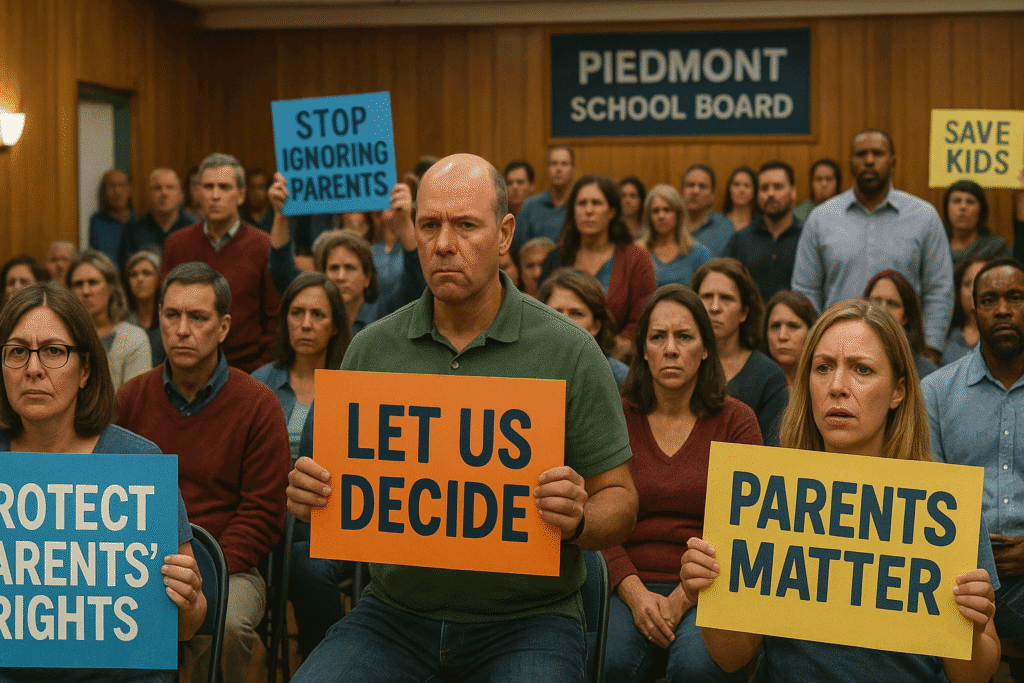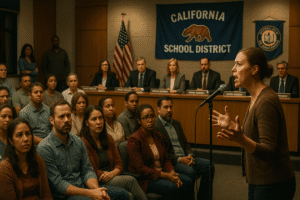Piedmont School Board Faces Backlash Over State Curriculum Mandate, Sparking Debate on Local Control


Piedmont, CA — Tensions are rising in Piedmont as the local school board grapples with the implementation of new state-mandated curriculum changes, igniting a spirited debate over local autonomy, parental rights, and educational priorities. At the heart of the controversy is the California Department of Education’s directive requiring all public schools to adopt a state-approved curriculum in areas such as ethnic studies, health education, and social-emotional learning. Many Piedmont parents, educators, and community leaders are questioning the wisdom—and constitutionality—of Sacramento’s top-down approach.
A Community at a Crossroads
At a recent Piedmont Unified School District board meeting, the usually orderly proceedings were met with a packed assembly hall, where parents and concerned citizens voiced their frustrations and fears. Some attendees carried signs reading “Let Us Decide” and “Protect Parents’ Rights,” underscoring a growing sentiment that local schools—and not distant officials—should set educational priorities.
“Piedmont has always valued rigorous academics and community involvement,” said resident and parent Laura Mitchell. “We don’t need bureaucrats dictating what our kids learn. We know our children and our community best.”
The State’s Mandate: What’s at Stake?
The new curriculum requirements, approved by the state legislature last year, mandate the inclusion of ethnic studies for high school graduation, expanded health education content, and a slate of lessons aimed at addressing social-emotional well-being. Proponents in Sacramento argue these changes are necessary to create more inclusive, equitable learning environments and to address issues such as bullying, mental health, and historical inequities.
However, critics argue that these mandates ignore local needs and values, and in some cases, run afoul of parents’ rights and constitutional protections for freedom of belief and speech.
Dr. Steve Reynolds, a former Piedmont school administrator, expressed concern: “Any time the state tells us how to educate our children, we lose a little bit of our community’s voice. These mandates take away flexibility from teachers and parents who know our students best.”
Parental Rights and Local Control
Conservative-leaning community members and local activists have been particularly vocal, asserting that the mandates erode parental rights and threaten the principle of local control over education—a bedrock value for many in Piedmont and neighboring Alameda County communities.
“The state’s approach is one-size-fits-all, and that doesn’t work in Piedmont,” said school board member Mark Hastings. “We need to protect parents’ ability to have a say in their children’s education. That’s not just good policy; it’s a constitutional value.”
Hastings and others have called for a formal resolution urging the state to grant waivers or allow districts flexibility in implementing the curriculum changes. A petition circulating in Piedmont has already garnered hundreds of signatures.
Fiscal Responsibility and Implementation Concerns
Beyond philosophical objections, practical concerns abound. Implementing the new curriculum will require teacher training, new materials, and expanded staff hours—costs that could stretch Piedmont’s already tight education budget. Some board members warn that these expenses could force cuts to popular programs in the arts, advanced academics, or extracurricular activities.
“We’re being asked to do more with less,” said Superintendent Allison Price. “While we support the goals of inclusion and student wellness, we need the flexibility and resources to implement changes in a way that makes sense for Piedmont.”
Community Response: Pushback and Proposals
The community’s response has been robust. At recent meetings, parents have proposed several alternatives, including opt-out provisions for sensitive curriculum topics, greater transparency in lesson planning, and the formation of a local advisory committee to review state-mandated materials.
Some parents have gone further, exploring the possibility of charter schools or independent study programs that would allow more curricular freedom. While such moves would be complex and controversial, they reflect the depth of frustration among some families.
The Broader Context
Piedmont’s debate mirrors similar battles playing out across California and the nation, where the balance between state oversight and local control is a persistent flashpoint. Issues such as parental rights, educational content, and fiscal responsibility are fueling a renewed push for local governance.
Alameda County Supervisor Janet Miller, whose district includes parts of Piedmont, acknowledged the complexity of the issue. “We want every student to feel safe and included, but we also must respect the diversity of opinions in our communities. Finding common ground will require listening and compromise.”
Looking Ahead
As the Piedmont school board prepares for a vote on how to proceed, all eyes are on whether the district will comply fully with the state mandate, seek modifications, or take a more confrontational stance. Whatever the outcome, the debate is likely to shape local politics—and educational policy—for years to come.
For now, the community is united in one respect: the belief that Piedmont’s schools are a vital part of its identity, and that decisions about education should reflect the values and voices of its residents.











